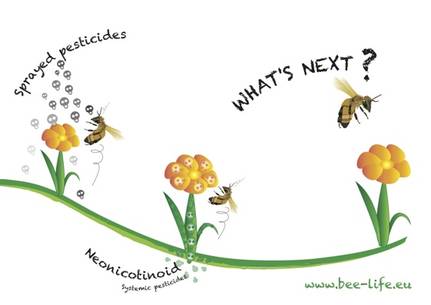News
|
Give Bees a Chance
Keeping bee's knees campaigning up for a better future without harmful pesticides
On 16th January 2013, the European Food Safety Authority (EFSA) published three reports on the toxicity risk to bees of 3 neonicotinoid pesticides: imidacloprid, thiamethoxam and clothianidin. EFSA's conclusions are clear: neonicotinoids pose a high risk to bees, either by the presence of these insecticides in nectar and pollen, by the dust produced when sowing coated seeds or by toxic exudates produced by treated plants.
In response to EFSA's report the European Commission is suggesting a 2-year ban on neonicotinoid pesticides starting from 1st June 2013. Initially the European Commission - in comitology - was supposed to give its final decision on EFSA's conclusions on 25th February. But the point was postponed to the next comitology meeting on 15th March, and no qualified majority could be found either for or against the proposal[1].
The next vote in Appeal Committee[2], will take place on 29th April.
In the meantime, it has been made clear that the Goliath pesticide industry is using strong tactics to push its arguments in favour of the use of neonicotinoid pesticides. Personal letters sent by Syngenta and Bayer - the two companies producing these substances- to the European Commission were published last week. Their lobbying has also been present in expensive and wide public campaigns in the national press and on the internet. On top of that, these chemical industry giants limit access to scientific information, compromising their own arguments and furthermore this information should, in accordance with EU legislation, be in the public domain.
Scientific arguments opposing the industry's position keep growing. In addition to the scientific evidence published already last year which demonstrated the risks of neonicotinoid pesticides on bees, a Greenpeace study published last week highlights that the elimination of neonicotinoids from agriculture is a crucial and highly effective first step to protect the health of bee populations.
The Greens/EFA Give Bees a Chance Campaign has already carried out several actions calling for a ban of neonicotinoid pesticides and they continue to raise awareness of the negative impacts of these bee-harming products on our food supply and biodiversity.
See what the Greens/EFA have done so far here:
[1] Slovakia, Romania, Czech Republic, Portugal, Austria, Hungary, Lithuania, Ireland and Greece rejected the proposal. The UK, Germany, Finland, Bulgaria and Estonia abstained [2] in Appeal Committee Member States are represented at higher level such as deputy Permanent representative. These are no longer the experts who attend the Standing Committee. In this Committee the chair ( for ANCO, normally the dep. Director General) shall endeavour to find solutions which command the widest possible support within the Committee.
Cross-party group letter of 90 MEPs to Commissioner Borg on a Green initiative, calling for a total ban on neonicotinoids:
Green briefing dismantling some of the claims made by the industry in their arguments against the suspension:
The Greens/EFA group will continue push for and support "bee's knees" actions by beekeepers organisations and civil society as a whole, calling for a total ban on neonicotinoids and denouncing the heavy industry lobbying against the ban. There are logical reasons behind the Greens/EFA position: the weight of scientific evidence means that precautionary action must be taken immediately. The precautionary principle as a course of action has also been recommended by the latest European Environment Agency study, in regard to the use of neonicotinoid pesticides on bees. A ban on neonicotinoids is also democratic as a large number of European citizens are calling for it in petitions launched at national or European level (see below to sign the petitions). Besides, alternatives to pesticides exist. It is possible to farm without neonicotinoids. The 'Pollinator friendly farming is possible' conference held in the European Parliament in March in coordination with the Greens/EFA group and NGO partners showed clearly that sustainable alternatives exist. Environmentally-friendly farming involving simple agronomic techniques such as crop rotation does not require the use of chemical pesticides. But more funding for research in this field is needed, instead, most of the financial support goes towards conventional chemical farming techniques. A switch towards improved environmentally-friendly farming methods is key to ensuring a better future for our pollinators and preserving the health and diversity of our crops and food supply. This campaign can be won! The next Appeal Committee is in a few days, on 29th April and we must keep the pressure on by continuing to campaign and here is some information compiled by the European Beekeepers Coordination on how to do that:Call your government to vote for the ban on neonicotinoids at the vote of the appeal committee:
Whether as a community or as an individual citizen you have the possibility to follow and join the petitions to ensure a better future without harmful pesticides:
Check out the UK campaign group 38 Degrees which is currently running a hugely successful campaign.[1] Slovakia, Romania, Czech Republic, Portugal, Austria, Hungary, Lithuania, Ireland and Greece rejected the proposal. The UK, Germany, Finland, Bulgaria and Estonia abstained [2] in Appeal Committee Member States are represented at higher level such as deputy Permanent representative. These are no longer the experts who attend the Standing Committee. In this Committee the chair ( for ANCO, normally the dep. Director General) shall endeavour to find solutions which command the widest possible support within the Committee.





